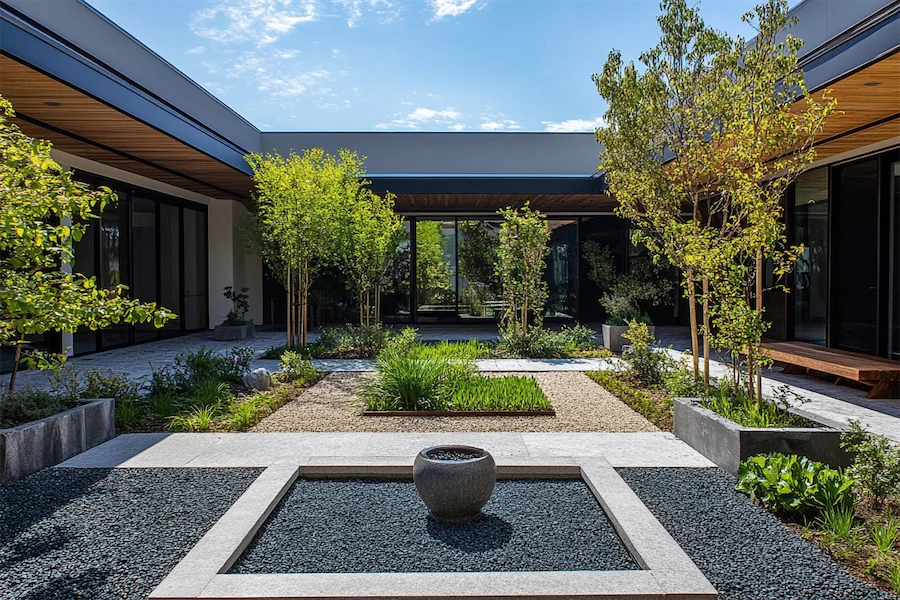A Zen Courtyard Garden is a tranquil outdoor space designed to promote relaxation and meditation, embodying the principles of simplicity, harmony, and natural beauty inherent in traditional Japanese gardens.
History and Origins of Zen Courtyard Gardens
Originating in Japan, Zen gardens, or “karesansui,” were traditionally created by monks as places for meditation and reflection. These minimalist dry landscapes utilize natural elements like rocks, gravel, and sand to represent the essence of nature, encouraging contemplation and inner peace.
Key Features of Zen Courtyard Gardens
- Rocks and Stones: Carefully positioned rocks symbolize mountains or islands, serving as focal points within the garden. The arrangement of these elements is deliberate, aiming to evoke a sense of balance and stability.
- Gravel or Sand: Raked gravel or sand represents ripples in water, adding a dynamic yet calming visual element. The act of raking itself is a meditative practice, fostering mindfulness and focus.
- Minimalist Plantings: Plant selection is restrained, often featuring evergreens, moss, or bamboo, contributing to a year-round serene atmosphere. The limited use of plants emphasizes simplicity and reduces distractions, aligning with Zen philosophy.
- Water Features: Incorporating elements like a bamboo water fountain introduces soothing sounds, enhancing the sensory experience and symbolizing purity. Water features also serve to balance the hard elements of rocks and gravel, creating harmony within the space.
Applications of Zen Courtyard Gardens
- Residential Spaces: Homeowners can transform small courtyards or unused outdoor areas into peaceful retreats, providing a personal sanctuary for relaxation and meditation. The compact nature of Zen courtyard gardens makes them suitable for urban environments where space is limited.
- Public and Commercial Areas: Incorporating Zen garden elements into office courtyards or public parks offers visitors a calming environment, promoting well-being and reducing stress. Such spaces can serve as communal areas for reflection, fostering a sense of community and tranquility.
Considerations When Creating a Zen Courtyard Garden
- Space Utilization: Even in limited spaces, thoughtful arrangement of elements can create a sense of openness and tranquility. Utilizing vertical space with features like bamboo fences or trellises can enhance the garden without overcrowding.
- Material Selection: Choosing natural, locally sourced materials for elements like rocks, gravel, and plants ensures harmony with the surrounding environment and supports sustainability. The textures and colors of these materials should complement each other to maintain visual coherence.
- Maintenance: Regular upkeep, such as raking gravel patterns and pruning plants, is essential to preserve the garden’s aesthetic and promote a meditative atmosphere. Engaging in these maintenance activities can also serve as a form of mindfulness practice, deepening one’s connection to the space.
Conclusion
A Zen Courtyard Garden offers a serene escape from the hustle and bustle of daily life, embodying the essence of simplicity and natural beauty. By thoughtfully integrating traditional elements and adhering to Zen principles, one can create a harmonious space that fosters peace, reflection, and a deeper connection to nature.
